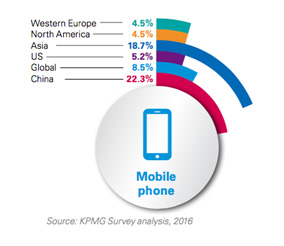- Have any questions?
- +61 280 062 806
- info@lycheecreative.com.au
Numbers don’t lie. China has the world’s fastest growing middle class in history and by 2022 will have over 550 million (That’s 1.5 times the US or 20 times the entire Australian population) households that earns 10-35 thousand USD per year. Furthermore, they are more consumption-oriented and have less debt.
Whether you’re in the real estate, education, retail, healthcare, or exporting industry, you cannot ignore these numbers. However, before you go out guns blazing in this potentially lucrative market, we are here to set a few things straight. Below are our top myths or misconceptions for every business that is thinking of entering the Chinese market:
Myth 1: Get Rich Quick
Businesses thinking they can just throw everything at the Chinese market and hoping it will stick are in for a rude awakening. Chinese shoppers are some of the most difficult to sell to. This is because they’ve seen everything before from their transition of being world’s largest factory to the world’s largest consumer. From counterfeit products, to water-downed version of products they’ve seen the lot. Think of it this way: how hard was it to grow your company in your home country? Now multiply that by 10. That should give you an idea of how difficult it is to get into the Chinese market. It will likely be a hard and grueling uphill battle and you will definitely require a clear marketing plan and strategy before you even begin to enter the market.
Myth 2: You Will Need a Physical Store in China
While having a physical store in China is a plus, it is not necessary. In fact, the younger generation are very tech savvy and prefer to socialise and shop online. In fact, Chinese customers currently leads the world in mobile shopping. However, you will need a good Chinese website and/or online store to sell your products or services.
Myth 3: You Will Need to Invest Vast Sums of Money
Long gone are the days when only the most powerful companies dare to enter the Chinese market. Due to the invention of the Internet, it is much easier than before to start selling to Chinese consumers. It is also much cost effective now with the invention of social media, SEO and SEM than with traditional marketing efforts.
Myth 4: Made in China Products are Inferior
While China has a reputation for making inferior products in the past. It is less guilty of doing that now so be prepared to face stiff local competition. Chinese consumers like to haggle but they are willing to pay a premium on quality products which brings us to:
Myth 5: Chinese Shoppers always prefer a lower priced product
Chinese shoppers in general like to get a bargain. However, this is different to always going for the lowest priced item. Due to widespread counterfeit problems in China, they are more likely to prefer quality products that’s a little more expensive to that of an inferior product. They are also more likely to research products before they buy online with over 60% buyers researching products online before buying.
Myth 6: You need to completely re-brand your business when entering the Chinese market
While it can be advantageous to have your brand translated, you don’t necessarily need everything catered for your Chinese customers. Retaining your image as a Western brand has many benefits such as being seen as authentic and high quality.
Myth 7: You only need to market to developed so called tier 1 cities in China including Shanghai, Beijing, Shenzhen and Guangzhou
China is a huge country. While tier 1 cities have the most disposable income, they only make up 10% of the Chinese population and is currently saturated with international malls and brands looking for a slice of the pie. Tier 2 and 3 cities are statistically more likely to shop online (27% of products purchased online) and can prove to be very lucrative if you can get your research and marketing right.
Myth 8: It will be difficult to get into the Chinese market
This may sound contradictory to the first myth but despite it being difficult to succeed in the Chinese market, foreign companies do have several distinct advantages. Just being a foreign company is one of them. By being foreign, you are able to take advantage of being perceived as of higher quality and authentic. Most Chinese shoppers still believe foreign companies have higher quality made products than local companies. You are able to have an advantage in marketing such as search engines because you are offering something unique.
Conclusion
The current Chinese market still provide ample opportunities for foreign investors who takes time to research and understand its market.




